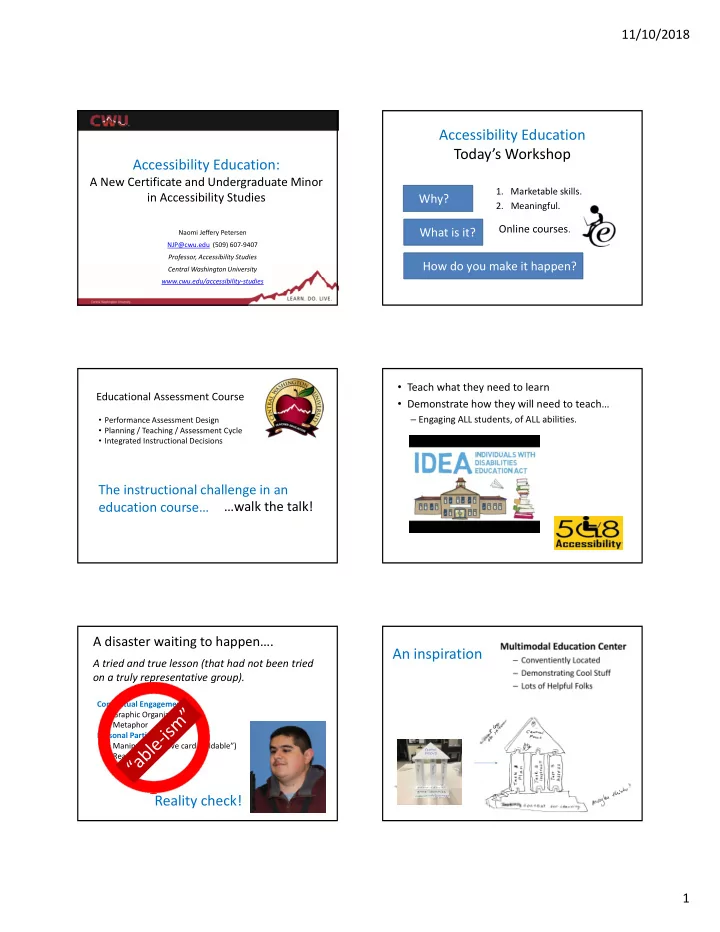

11/10/2018 Accessibility Education Today’s Workshop Accessibility Education: A New Certificate and Undergraduate Minor 1. Marketable skills. in Accessibility Studies Why? 2. Meaningful. Online courses. What is it? Naomi Jeffery Petersen NJP@cwu.edu (509) 607‐9407 Professor, Accessibility Studies How do you make it happen? Central Washington University www.cwu.edu/accessibility‐studies • Teach what they need to learn Educational Assessment Course • Demonstrate how they will need to teach… – Engaging ALL students, of ALL abilities. • Performance Assessment Design • Planning / Teaching / Assessment Cycle • Integrated Instructional Decisions The instructional challenge in an education course… …walk the talk! A disaster waiting to happen…. An inspiration A tried and true lesson (that had not been tried on a truly representative group). Conceptual Engagement • Graphic Organizer • Metaphor Personal Participation • Manipulating (five card “foldable”) • Reading • Writing Reality check! 1
11/10/2018 Collaboration Our prototype! • Dozens of design hours • Several printing failures • LOTS of learning about the logic of Braille • And the logic of 3‐D Hollingsworth, F., & Petersen, N. J. (Nov, 2017) Tactile Teachables: Expanding Accessibility with 3D Printing. Educause (Editors’ Pick). https://er.educause.edu/articles/2017/11/ tactile‐teachables‐expanding‐accessibility‐ with‐3d‐ printing?utm_source=Informz&utm_medi um=Email&utm_campaign=ER#_zs7W2Me 1_zlcisM4 But a new inspiration trajectory… Classroom Teachers could use this knowledge…. Phase I: Discussion of core concepts …so let’s keep track Phase II: Collaboration Online Certificate or Minor Phase III: Prototyping and feedback and write a manual Phase IV: Design Process for others to use Developing competence in recognizing Phase V: Final Product where, when, and how to include people There’s a crying need for people with these skills! Let’s offer classes! with varying degrees of ability. We need an academic voice for people www.cwu.edu/ Accessibility‐Studies with disabilities… which is everyone! 305 325 435 Elective Capstone 305 325 435 Elective Capstone ASP 305 Accessibility & User Experience. ASP 325 Universal Design Proactive accessibility design for high incidence Quality of life issues of accessibility in everyday problems in commercial, leisure, occupational, and experiences and environments. Changes in laws and personal living spaces. Assistive technology, adapted attitudes about the need for proactive accessible architecture, differentiated activity. Standards for design. Current careers requiring competence in safety and equity. troubleshooting accessibility. 4 credits. Online. Winter , Summer 4 credits. Fall, Winter, Spring, Summer. – Insert your data source here if applicable or delete. 2
11/10/2018 305 325 435 Elective Capstone 305 325 435 Elective Capstone ASP 435 Accessible Information Design ASP 187 Special Topics in Accessibility Standards for public communication, such as 5 credit. Online. Fall 2019 advertising and agency information. Effective Job coaching. Issues of disclosure and advocacy. Laws and civil rights legislation and court decisions. Social justice and social psychology. 5 credits. Online. Spring, Summer. Not required for the ASP Certificate. Part of the new General Education Program. – Insert your data source here if applicable or delete. 305 325 435 Elective Capstone 305 UX Stage 2 UD Stage 3 IT Elective Capstone ASP 490 Accessibility Internship ASP 485 Accessibility Capstone Experiential‐based capstone course. Accessibility ASP 492 Accessibility Practicum competence demonstrated in portfolio and capstone project. Laboratory time will include a variety of service Field experience in a real‐world context for observing, learning, professional visits and applied practical analyzing and investigating principles and issues crucial experience. Strategies for engaging stakeholders in to developing competence in understanding efforts to trouble‐shooting accommodations. minimize barriers for all people, especially those with 3 credit. Online. Arranged individually. specific limitations in their perception or mobility. 1‐12 credit. Arranged individually. But how did the program happen? Two groups serving the same population Phase I: Curriculum Development Procedures Faculty Fa Phase II: Collaboration, Communication Phase III: Feedback Feedback Feedback Phase IV: Curriculum Approval Phase V: Recruiting What are the hurdles? Disabi bility S lity Services ices 3
11/10/2018 Program Landmarks SWOT • June 2016 Curriculum developed. Universal Design for Learning • Feb 2017 Degrees approved. = Better Focus & Format • Mar 2017 First course offered. • May 2017 Diversability Day launch. Accessibility Studies Program • June 2017 First integrated summer session. = Better Visibility and Voice • Sep 2017 First program completers. Not t enough re gh resources a urces and expertise. rtise. How is the program going? The program continues to develop. Courses are offered regularly. • Students are requesting optional internships. • A graduate specialization is in progress. Course Summer Fall Winter Spring ASP 305 Accessibility & User Experience X X X X • An interdisciplinary major is in progress. ASP 325 Universal Design X X • The new general education program includes ASP 435 Accessible Information Design X X ASP 485 Accessibility Capstone X X ASP courses. Courses are revised in response to assessments. Qualified faculty are cohesive and dynamic. Online application system is working well. ASP courses are now electives in other programs Accessibility issues are a component of anthropological study. • Museum Studies • Sports Management Social Model of Disability Anthropology • Family and Child Life • Being human is an • Unlike the medical model. • Social Services integration of biological, • Environment is the • cultural, material and Interdisciplinary Social Science disabling factor. linguistic capacities. • Stigma is a significant • Focus on culture Advising materials are now available for many cultural barrier. and cultural diversity. undergraduate programs and careers • Teachers • HR Professionals • Computer Science 4
Recommend
More recommend